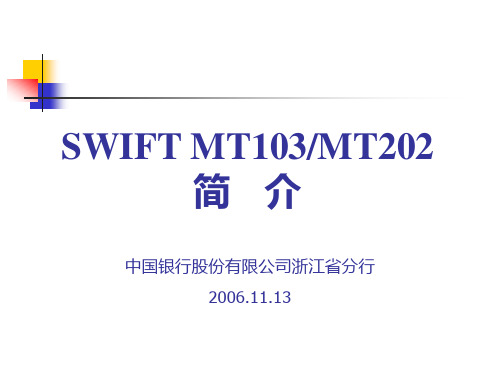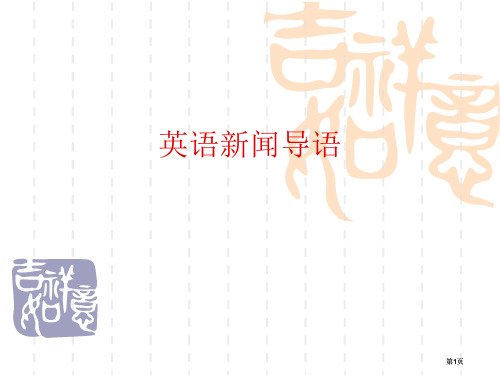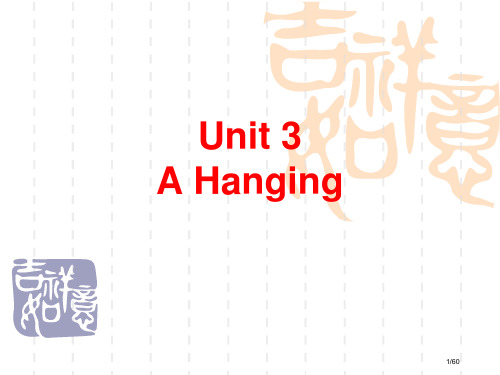swift 公开课
商务英语写作saleletter省公开课一等奖全国示范课微课金奖PPT课件

Exercises:
请现在就来租车, 让我们带走你旅途的烦恼。
Reserve your car now and let us take the worry out of your travel arrangements.
我们热情欢迎您参加本届时装展,我们最新 的羊绒衫系列在38号展台展出.
You are cordially invited to this session of fashion show, in which our latest collection of cashmere sweaters is displayed at No.38 exhibition stand.
2). The Body
to be healthy to be wealthy to have a safe future to be comfortable to be better than others to be attractive to the opposite sex
Directions:
3). The Closing
Make the reader act !
Money-back guarantees Free samples Trial periods Payment plans
3). The Closing
If you are not completely satisfied, then return the alarm clock with no obligation. Remember, this offer is only open for two days. By sending the card before May 24, you will obtain a special discount of 5% at our introductory stage.
SWIFT介绍.ppt

/ACC/ /INT/ /REC/ /INS/
选择栏位
二)与费用有关
71A 费用分配 OUR
SHA
BEN
1.71F 发报行费用 不出现 2.71G 收报行费用 可选
可选 不出现
必选 不出现
3.33B 汇款人指示的币别与金额(如报文中出现71F或 71G则必选)
59A 不能与50a场中的50A同时出现,否则即为MT202 报文。 6.71A: 费用细则,即汇款费用由谁来承担。
OUR—汇款人承担所有的费用 SHA –-各自承担所有的费用 BEN—收款人承担所有的费用 根据国际惯例,一般情况下,以SHA各自承担为主,由汇款 人支付汇款行的费用,除此之外,所有的费用都由收款人来 承担。
中国银行股份有限公司浙江省分行 2006.11.13
汇款业务基本知识
汇款人
付款指示
汇出行
资金
收款人
通知
MT103 付讫借记通知
收款行
MT103
MT103是由汇款行或受汇款行委托的银行直接或通过 代理行发送给另一家银行,用来发送付款指示的报文 格式,从发报行的角度看,汇款人中至少有一方是非 金融机构。该报文格式只能用于发送无条件的付款指 示。它不能用于向托收行发送光票托收项下的付款通 知。
50K: /453809001003
ZHEJIANG TEA TRADING CO。,LTD。
56A: SANWUS33
57A: SANWJPJT
59: /87856778
LILLY PHILIPS
2-1-5 NIHONBASHI 10, OSAKA
70: /RFB/ZJ001/03
商务英语学习公开课获奖课件百校联赛一等奖课件

• Sometimes referred to as business credit or commercial lending, commercial credit has to do with the ability of a business to obtain goods and services from a supplier.
支付告知书
汇出行
⑶以电信方式指示付款
汇入行
(Remitting Bank) ⑹寄交“付迄收据” (Paying Bank)
2024/10/10
3、票汇(remittance by banker’s draft,D/D)
(1)定义 The buyer buys a draft (check) from a local bank and sends it by
mail to the seller, the seller or his appointed person can collect money from the relative bank at his end against the draft send by the buyer. 汇出行应汇款人旳申请,开立以其代理行或其他往来银行为 付款人旳银行即期汇票,列明收款人名称、金额等,交由汇 款人自行寄交给收款人,收款人凭票向付款行取款旳一种汇 付方式。 (2)优缺陷 优点:费用最低 缺陷:收款速度最慢,应用不太广泛。
通俗地说法,也即托收是债权人(出口人)出 具债权凭证委托银行向债务人(进口人)收取货款 旳一种国际贸易货款支付方式。又叫银行托收。
2024/10/10
托收旳当事人及其关系
• 委托人(Principal):收款人/出口方 • 托收行(Remitting bank):出口方银行 • 代收行(Collecting bank):进口方银行 • 付款人(Payer):进口方 • 需要时旳代理(Customer’s Representative in
JonathanSwift约翰森斯威夫特PPT精选文档

•.
•14
Swift’s Artistic Features
– Satire
• His satire is usually masked by an outward gravity and an apparent earnestness which renders his satire all the more powerful.
2.In Swift’s book there are lots of people while in Defoe’s there is only one person named Friday.
3.Swift not only criticizes the evils of the English bourgeoisie but those of other bourgeois countries.
1729: A Modest Proposal
1742: establishes site for insane asylum( St. Patrick’s Hospital)
•.
•5
Illness and Death
Brain disease Unmarried life-time Madness Died Dr. Swift’s Madhouse
•.
•18
•.
•19
• a master satirist;
• deadly(非常有效的) irony;
• powerful satisatire is relatively unique in that he offers no resolutions.
英语新闻导语英美报刊选读市公开课金奖市赛课一等奖课件

▪ 上月, GeraldoAsamoah终于用脚将自己踢 进了足球史。他成为穿着德国国家足球队 队服第一位非洲裔黑人球员。
第16页
▪ 这条导语将整个新闻主要事实, 用概括性语 言叙述了出来, 读者读完导语便知道整个新 闻大约了, 要想详细理解新闻背景后新闻, 便必须继续进行阅读, 读者胃口也被吊了起 来。当然, 其概括是对详细新闻事实概括, 而非抽象空洞概述。
▪ 延缓式导语又被称为间接式导语, 它最为突 出特点是将新闻中最关键信息并不直接告 诉给读者, 而是用情节、细节、故事精彩片 段, 激发读者兴趣、好奇心、探知欲, 借此 引领读者进入新闻事件关键所在。故而这 种导语主要用于故事性、趣味性强新闻、 新闻特稿及各类软新闻写作。
第10页
▪ It sounds like the plot of a Hollywood thriller but it’s true: Just nine days before this year’ s Academy Awards,Oscar has disappeared, the FBI is hunting for him and a reward of 50,000 has been offered for his return.
第14页
▪ Geraldo Asamoah kicked his way into sports history last month, when he became the first black African-born player to wear the jersey of Germany’s national soccer team.
▪ 从新闻文字表现方式上分类, 新闻英语导语 可分为概括式导语(summary lead)、描写 式导语(descriptive lead)、引语式导语 (quotation lead)、悬念式导语 (suspense lead)。
《金融英语》授课教案

2010年度重庆市高等学校双语教学示范课程《金融英语》授课教案重庆工商大学融智学院金融系信用管理教研室《金融英语》课程组二0一一年十一月《金融英语》授课教案Chapter 1:About Money (第一章关于货币)[教学目的] 温习在《金融学》中已经学过的有关货币起源、特点、职能及类型的基础知识,掌握相应的英语词汇和表达方式。
[教学重点与难点]货币的特征、职能;货币发展的沿革。
[教学时数] 2学时[教学方法与手段] 多媒体教学,讲授I.Origin of MoneyPrimitive society ( during early times)特点在于:self-sufficient, which means that each economic unit produced all it consumed and consumed all it produced, so their wants could be met by themselves.此处辨析解释economy, economic的含义。
由此引出Barter物物交换,以物易物1)requirement: double-coincidence of wants 需求的双重耦合(举例说明)2)drawbacks of barter:① Wants cannot be precisely matched;② The problem of value determination.③ The indivisibility of large items.II.What is Money?(逐点讲解)Functions(职能)1)medium of exchange (交易媒介)2)measurement of value (价值尺度)3)store of value (贮藏手段)4)standard of deferred payment (支付手段)Characteristics:1) Generally acceptable 2) Durable 3) Portable4) Divisible 5) Uniform 6) Counterfeit proof7) Stable in valueIII.Money in Modern SocietyIV.Writing: About Money in My Mind课后自主学习阅读材料:The International Financial World (国际金融界)附:The International Financial W orldEconomic activity began with the caveman, who was economically self-sufficient. He did his own hunting, found his own shelter, and provided for his own needs. As primitive populations grew and developed, the principle of division of labor evolved. One person was more able to perform some activity than another, and therefore each person concentrated on what he did best. While one hunted, another fished. The hunter then traded his surplus to the fisherman, and thus each benefited from the variety of diet.In today’s complex economic world neither individuals nor nations are self-sufficient. Nations have utilized different economic resources; people have developed different skills. This is the foundation of world trade and economic activity. As a result of this trade and activity, international finance and banking have evolved. For example, the U.S is a major consumer of coffee, yet it does not have the climate to grow any of its own. Consequently, the U.S must import coffee from countries that grow coffee efficiently. On the other hand, the U.S has large industrial plants capable of producing a variety of goods, such as chemicals and airplanes, which can be sold to nations that need them. If nations traded item for item, such as one automobile for 10,000 bags of coffee, foreign trade would be extremely cumbersome and restrictive. But instead of barter, which is the trade of goodswithout an exchange of money, the U.S. receives money in payment for what it sells. It pays for Brazilian coffee with dollars, which in turn can buy textiles from Great Britain, which can then buy tobacco from the U.S. Foreign trade, the exchange of goods between nations, takes place for many reasons. The first, as mentioned above, is that no nation has all of the commodities that it needs. Raw materials are scattered around the world. Large deposits of copper are mined in Peru and Zaire, diamonds are mined in South Africa, and petroleum is recovered in the Middle East. Countries that do not have these resources within their own boundaries must buy from countries that export them.Foreign trade also occurs because a country often does not have enough of a particular item to meet its needs. Although the U.S. is a major producer of sugar, it consumes more than it can produce internally and thus must import sugar.Third, one nation can sell some items at a lower cost than other countries. Japan has been able to export large quantities of radios and television sets because it can produce them more efficiently than other countries. It is cheaper for the U.S. to buy these from Japan than to produce them domestically. According to economic theory, Japan should produce and export those items from which it derives a comparative advantage. It should also buy and import what it needs from those countries that have a comparative advantage in the desired item.Finally, foreign trade takes place because of innovation or style. Even though the U.S. produces more automobiles than any other country, it still imports large quantities of autos from Germany, Japan, and Sweden, primarily because there is a market for them in the U.S.For most nations, exports and imports are the most important international activities. When nations export more than they import, they are said to have favorable balance of trade. When they import more than they export, an unfavorable balance of trade exists. Nations try to maintain a favorable balance of trade, which assures them of the means to buy necessary imports. Some nations base their entire economy on the concept of importing raw materials, processing them into manufactured goods, and then exporting the finished goods. The subsequent profits enable these nations to import the food they need.In addition to visible trade, which involves the import and export of goods and merchandise, there is also invisible trade, which involves the exchange of services between nations.As an example of invisible trade, Brazilian coffee is usually transported by ocean vessels because these steamships are the cheapest method of transportation. Nations such as Greece and Norway and Hong Kong have large maritime fleets, which can provide this transportation service. When an exporter arranges for this kind of transportation, he rents space in the cargo compartment of a ship for one voyage.The prudent exporter purchases insurance for his cargo’s voyage. While at sea, a cargo is vulnerable to many dangers, the most obvious being that the ship may sink. In this event, the exporter who has purchased insurance is reimbursed. Otherwise, he may suffer a complete loss. Thus, insurance is another service in which some nations specialize. Great Britain, because of the development of Lloyd’s of London, is a leading exporter of this service, earning fees for insuring other nations’ foreign trade.Some nations possess little in the way of exportable commodities or manufactured goods, but they have a mild and sunny climate. During the winter, the Bahamas attract numbers of tourists, particularly from the northeastern U.S., who spend money for hotel accommodations, meals, taxes, and so on. Tourism, therefore, is another form of invisible trade.Invisible trade can be as important to some nations as the export of raw materials or commodities is to others. In both cases, the nations earn money to buy necessities.The different kinds of trade that nations engage in are varied and complex, a mixture of visible and invisible trade. Most nations are more dependent on exports than on any other activity. The earnings from exports pay for the imports that they need and want. A nation’s balance of payments is a record of these complex transactions. The two most important categories in any nation’s balance of payments are its visible and invisible trade. A third very important category is investments.Investments are the means by which nations utilize the capital of other nations to build factories and develop mines fro their own industrial base. The railroads of the U.S. and South America were built by British capital. This capital paid for the costs of construction, including materials and the wages of the workers, and the locomotives and freight cars.Investment can have a crucial impact on a nation’s balance of payments. When an investment is made, capital enters a country, enabling it to import manufactured materials to build a new manufacturing plant and to pay workers to build it. Once the plant is operative, it provides both jobs and taxes for the host country and, in time,produces new manufactured goods for export. In this way, investment acts as a catalyst in economic growth for the developed countries, as well as developing countries throughout the world.In subsequent years, an investment should yield a profit. Dividends, sums of money paid to shareholders of a corporation out of earnings, can then be remitted to the investing country. From the perspective of the balance of payments, in the year the investment is made, the host country credits income to its balance of payments, and the investing country records a debit. This is reversed in the following years. The dividends then represent an expense for the host country and income for the investing country.After calculating all of the entries in its balance of payments, a nation has either a net inflow or a net outflow of money. It should be noted that the statistics used in determining a deficit (shortage) or surplus (excess) are inexact; information is reported by a variety of sources, and there are bound to be mistakes and omissions. The statistical difference between these sources is balanced by an entry entitled ―Net Errors and Omissions‖. The final result is either an increase or a decrease in the nation’s reserves.These reserves may be compared to an individual’s saving. For a nation, they are maintained in holdings of gold and official deposits in foreign currencies, such as U.S. dollars, pounds sterling, deutsche marks, and so on. A deficit in the balance of payments can be accommodated by drawing on (removing some of) the reserves, that is, the previous savings. But if a nation’s balance of payments continues in deficit for some time, then the reserves will be insufficient to cover further withdrawals, and additional measures must be taken.The most direct means of correcting a deficit in the balance of payments and having an immediate impact is by reducing imports. This can be accomplished by imposing tariffs, quotas, or both. If successful, the cost of imports rises in the local market, and the imported goods are comparatively more expensive to the consumer than the locally made goods. When a quota is imposed, the quantity previously imported and paid for is reduced.In either case, the net effect is the reduction of the nation’s outflow of money. Other measures may limit invisible trade expenditures. For example, citizens may be prohibited from taking more than a specified amount of money with them when they travel abroad. Capital for investments abroad can be restricted by requiring governmental approval for any new foreign investments.If these measures are insufficient, a country may devalue its currency. This immediately makes imports more expensive and exports more competitive, since the importing country can now pay for the first country’s imports with less of their currency than previously. In time, these advantages are eliminated.Gold, and to a lesser extent silver, have been the traditional reserves. At one time, gold moved freely from country to country, but successive constraints have been imposed in the past 50 years. Today, gold counts as only one form among many in the reserves of a country.Notes1. Balance of payments: the difference between a nation’s total payments to, and receipts from, foreign nations during a specific period. 国际收支2. Balance of trade: the difference between the value of imports and exports, including in some instances the related freight and insurance premiums. 贸易差额3. Capital: Funds invested by individual or corporate share-holders to establish an enterprise. 资(本)金Chapter 2:Commercial Banking (商业银行)[教学目的]本章是介绍商业银行的基本知识,包括私人业务和公司业务。
unit1Financialsystem金融英语第一课省名师优质课赛课获奖课件市赛课一等奖课件

Ⅱ. Constitution of financial system
2. Financial intermediaries
current year.
2. allocation
allocation of capital allocation of resources
资本配置 资源配置
The total cost of the project was found on allocation to be the materials ₤ 255, labor ₤ 570, machine-hire ₤ 175, total ₤ 1000.
3. Other components of the financial system
33 system
Key words, phrases and special terms
1. allocate 2. deficit 3. investor 4. return 5. consumption 6. prospective 7. incentive 8. pose 9. maturity 10.mismatch 11. coordinate 12. intermediary 13. bond 14. stock
UK RBS 5 HSBC Holdings 汇丰集团 UK HBC 6 Wells Fargo & Co 美国富国银行 US
❖13 Goldman Sachs 高盛集团 US GS 14 BNP Paribas 法国巴黎银行 France BNPQY 15 Barclays Bank 英国巴克莱银行 UK BCS 16 Mizuho Financial Group 日本瑞穗金融集团 Japan MFG 17 Morgan Stanley 摩根士丹利企业 US MS 18 UniCredit 意大利联合信贷银行 Italy 19 Sumitomo Mitsui Financial Group 日本三井住友金融集团 Japan SMFJY 20 ING Bank 荷兰国际集团 Netherlands ING 21 Deutsche Bank 德意志银行 Germany DB 22 Rabobank Group 荷兰合作银行 Netherlands 23 Societe Generale 法国兴业银行 France SCGLY 24 Agricultural Bank of China 中国农业银行 China 25 Intesa Sanpaolo 意大利联合圣保罗银行 Italy IITSF
Unit-3.A-hanging.-市公开课一等奖省赛课微课金奖PPT课件

▪ To provide free and effective legal representation and assistance to those individuals who are facing the death penalty;
▪ To promote the restriction of the death penalty in line with international minimum legal requirements;
9/60
7. Poison gas: Cyanide capsules are dropped into acid producing Hydrogen Cyanide, a deadly gas. This takes many minutes of agony before a person dies.
2/60
George Orwellห้องสมุดไป่ตู้
3/60
▪ Eric Arthur Blair (25 June 1903 – 21 January 1950), better known by his pen name George Orwell, was an English author. His work is marked by a profound consciousness of social injustice, an intense, revolutionary opposition to totalitarianism(极权主义), a passion for clarity in language and a belief in democratic socialism.
Unit 3 A Hanging
